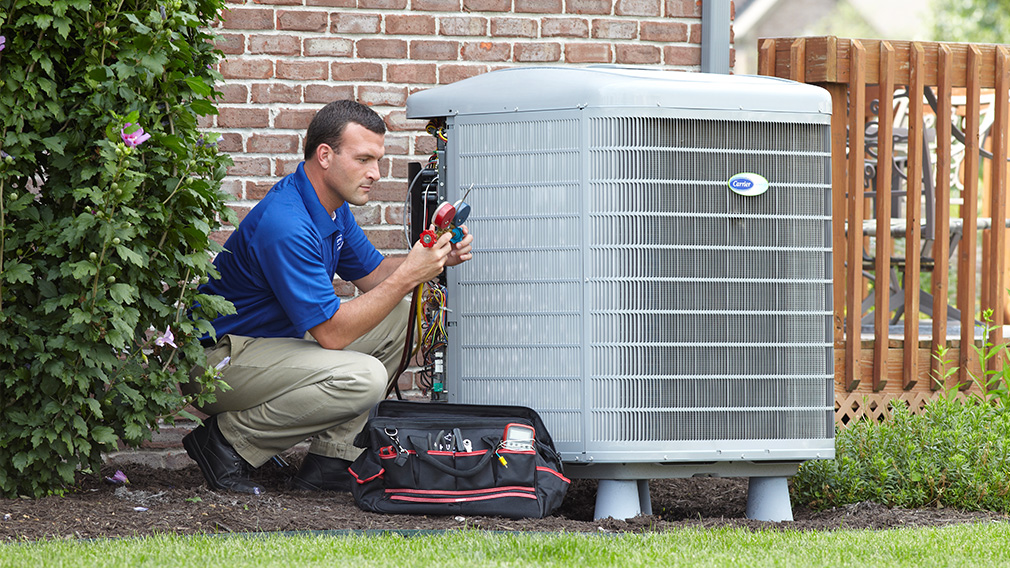The landscaping plays an essential but frequently ignored role in the efficiency of your HVAC system. A lot of homeowners focus on the interior components of the heating and cooling systems, however the exterior environment can significantly impact performance. The way your home is landscaped can affect airflow, temperature regulation, and even energy consumption, making it important to consider during optimization of the HVAC efficiency.
Understanding the relationship between landscaping and HVAC systems can lead to improved comfort and reduced energy bills. Strategic planting, the placement of shade trees, and proper garden designs can enhance the effectiveness of the effectiveness of the heating and cooling units. This article discusses the various ways in which landscaping choices can influence the HVAC system's efficiency, helping you make wise decisions that benefit both your wallet.
Grasping Heating, Ventilation, and Air Conditioning Technologies
HVAC stands for heat generation, ventilation, and air conditioning. It refers to the technology used for indoor environmental comfort, encompassing heating and cooling systems in home and commercial buildings. A well-functioning HVAC system is crucial for ensuring a pleasant climate all year long, as well as providing good indoor air quality. Grasping the fundamentals of how HVAC systems operate is important for residents and commercial entities alike.
The warm air generation component typically involves heaters or heat pumps that create warm air. This air is then spread through ductwork or pipes. On air conditioner installation , air conditioning units pull warm air from within the building and cool it before circulating it back. Air exchange plays a key role by permitting fresh outdoor air to come into the space while exhausting stale indoor air. This balance of heating, cooling, and ventilation is essential for overall comfort and energy efficiency.
Heating and cooling systems can vary significantly depending on the dimensions and type of the building. Residential systems often consist of central air conditioning systems and gas or electric heating devices, while larger commercial systems might feature more advanced configurations like chillers or package units. Understanding your own heating and cooling system can help you spot issues, schedule maintenance, and make educated decisions about upgrades or replacements when necessary.
Frequent HVAC Problems and Resolutions
One of the primary common problems homeowners encounter with their HVAC systems is insufficient heating or cooling. This problem can arise from multiple sources, including a clogged air filter, blocked ducts, or a malfunctioning thermostat. Regular maintenance, such as changing air filters on a monthly basis and ensuring that vents are not blocked, can prevent this issue. If the issue persists, it may be time to check the thermostat's settings or think about hiring a technician to diagnose any hidden issues.
Another common issue is strange noises coming from the HVAC unit, which can indicate multiple potential problems. Noises such as rattling, squealing, or banging may suggest loose components, worn-out bearings, or debris within the system. Homeowners should not ignore these noises; instead, they should schedule a professional inspection to pinpoint and resolve the source of the noise. Seasonal tune-ups can help identify these issues early before they become more serious into major repairs.
Finally, refrigerant leaks can seriously impact the effectiveness of an HVAC system. Low refrigerant levels not only reduce cooling efficiency but can also cause the compressor to fail. If you notice that your system is not cooling adequately and see ice buildup on the coils, it's crucial to contact an HVAC professional. They can locate any leaks, recharge the system, and ensure it operates efficiently, enhancing both comfort and energy savings.
HVAC Servicing and Performance Guidelines

Consistent maintenance of your HVAC system is crucial for maintaining its efficiency and durability. Commence by updating or washing air filters from one to three months. Dirty filters block airflow, causing your system to work harder, which can lead to increased energy costs and possible system failures. Additionally, ensure that all vents and ducts are free to promote maximum airflow throughout your home.
Another important maintenance tip is to arrange seasonal maintenance checks for your Heating, Ventilation, and Air Conditioning system. A certified technician can carry out a thorough inspection and cleaning of parts, such as coils and fans, to ensure everything running smoothly. This proactive approach not only improves efficiency but also allows for the early detection of possible issues that could lead to costly repairs or system replacements later on.
In conclusion, consider your thermostat settings and the overall insulation of your home. Automated thermostats can assist you maintain comfortable temperatures while lowering energy consumption. Ensure your home is well-insulated to prevent heat loss in winter and retain cool air inside during the summer. These minor adjustments can greatly impact your Heating, Ventilation, and Air Conditioning system’s performance and your energy bills over time.
